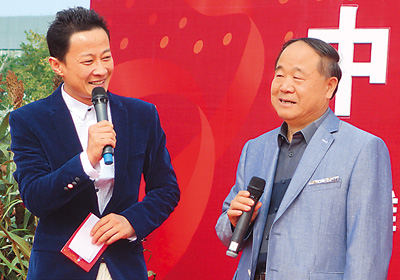 J-10 fighters show aerobatic stunts in smog-free sky
J-10 fighters show aerobatic stunts in smog-free sky
 Top 10 charming female soldiers of the PLA
Top 10 charming female soldiers of the PLA
 Charming contestants of Shanghai Int’l Model Contest
Charming contestants of Shanghai Int’l Model Contest
 Most amazing chi-pao beauties
Most amazing chi-pao beauties
 Beauties forever
Beauties forever
 Picturesque autumn scenery of Hongshan Army Horse Ranch
Picturesque autumn scenery of Hongshan Army Horse Ranch
 Lingerie show at 2014 Miss China
Lingerie show at 2014 Miss China
 Swans begin to migrate from Xinjiang
Swans begin to migrate from Xinjiang
 30 romantic and beautiful sceneries around world
30 romantic and beautiful sceneries around world
 Beautiful autumn leaves around the world
Beautiful autumn leaves around the world
 |
| Mo delivers speech at Hong Gao Liang Cultural Festival on Oct. 11, 2014. (People's Daily Overseas Edition/Chen Zhenkai) |
The 5th Hong Gao Liang Cultural Festival (Gaomi) opened on October 11, 2014. Two years ago, on the same day, Mo Yan became the first Chinese winner of Nobel Prize for literature. While giving interviews, Mo talked about his home town, culture and experiences over the past two years.
"Nowhere is better than home," said Mo. Most of the stories in Mo's works take place in his home town of Gaomi, in Dongbei,. "The home town, a kind of local memory, is a perpetual theme in Chinese literature. For instance, poets in Tang and Song dynasties created marvelous Chinese poems by expressing their sorrows at parting and their nostalgia for their dear home towns." In Mo's works, he writes about his childhood, his classmates, his teachers and parents, his favorite food… Some murders that happened there feature in his novel Hong Gao Liang (Red Sorghum), such as the SunjiaKou ambush and the Gongpo Temple murder.
'Gaomi town in Dongbei' is a literary concept. But it is not the same as his real hometown, Mo explains. "What writers produce is related to their literary creations, and these are definitely accumulations. Stories and experiences of a writer and the people he has met can all become materials in his writing and be adapted into the so-called home town stories." In June this year, Mo delivered a speech called 'Novels and the home town', in which he said that the home town is a theme that no writer can resist. "Writers develop their home towns by means of literature. What they are really doing is elevating the localites that are dear to them."
During the festival, many Gaomi-born celebrities attended a forum that celebrated the 20th anniversary of Gaomi evolving from a county to a city. There can be no doubt that Mo Yan was the most eye-catching attraction. Mo said that like every city in China, Gaomi has changed for the better after twenty years of development. Two years ago when Mo won the Nobel Prize for literature,Gaomi became an overnight sensation for people all around the world.
Since then, Mo has become a calling card for the city, and his influence can be found everywhere: the Mao opera Hong Gao Liang , adapted from Mo's novel, debuted on Oct. 10; a comic book, about Mo Yan's childhood went on sale at Gaomi Culture & Sports Park on Oct. 11; a seminar on Mo's works will be held during the festival; on Oct. 27, the TV series Hong Gao Liang will premiere on SDTV.
After winning the prize, Mo began to represent China in various cultural exchange activities. This year he has visited scores of cities in America and Europe. Two weeks ago he attended the 10th anniversary of the Confucius Institute in Sofia, Bulgaria. Speaking at the event he said that there are many precious treasures in Chinese culture and ethnic arts, which belong not only to China but also the whole world.
"Compared to cultural icons and art forms, thoughts have a great influence over people. Chinese people are familiar with western philosophers, such as Hegel and Kant. At the same time, our Confucius, Laozi, Zhuangzi and Chinese Buddhism are now well known to westerners and have become part of the treasury of world thinking."
Mo's works have been translated into many languages and he is always ready to talk to foreign journalists who have read his novels and watched Chinese films. "All the people in the world - we share different cultural backgrounds but have the same feelings." In France, Mo once invited an eminent intellectual who used to be a government minister to dinner. "I paid the bill and he was really happy," said Mo. "Just as in China, you will feel good if I treat you to a meal. Regardless of nationalities, we are all the same at heart. We are all emotional creatures. Of course people will appreciate our sincerity, if we treat them with true hearts. And communications between nations and ethnic groups are a kind of interaction of emotions. If we treat others sincerely, we will be rewarded with sincerity."
The article is edited and translated from《家乡的莫言 世界的莫言——诺奖两周年,莫言在高密接受本报专访》 by Chen Jingtong , source: People’s Daily Overseas Edition, author: Chen Zhenkai, Zhang Yuanqing
 |
 Standard faces for each countries
Standard faces for each countries Who is China's campus beauty queen?
Who is China's campus beauty queen? Netizens fall in love with champion swimmer Ning Zetao
Netizens fall in love with champion swimmer Ning Zetao Vibrant 21-year-old and her own Cheongsam brand
Vibrant 21-year-old and her own Cheongsam brand Fashion style: Faye Wong vs Cecilia Cheung
Fashion style: Faye Wong vs Cecilia Cheung Jungle law: leopard preys on impala
Jungle law: leopard preys on impala Female bus driver drives Land Rover for commuting
Female bus driver drives Land Rover for commuting Leading director Wang Quan'an detained for 'buying sex'
Leading director Wang Quan'an detained for 'buying sex' Amazing aerial photos of China's Xisha Islands
Amazing aerial photos of China's Xisha Islands Top 10 handsome football players
Top 10 handsome football players  Top 10 Chinese goddesses
Top 10 Chinese goddesses  Top 20 hottest women in the world in 2014
Top 20 hottest women in the world in 2014 Top 10 fifth generation jet fighters in the world
Top 10 fifth generation jet fighters in the world Top 10 pure beauties in showbiz
Top 10 pure beauties in showbiz  Top 10 world's highest-paid models 2014
Top 10 world's highest-paid models 2014 The most gorgeous Chinese women
The most gorgeous Chinese women Top 10 most handsome faces in Asia
Top 10 most handsome faces in AsiaDay|Week|Month